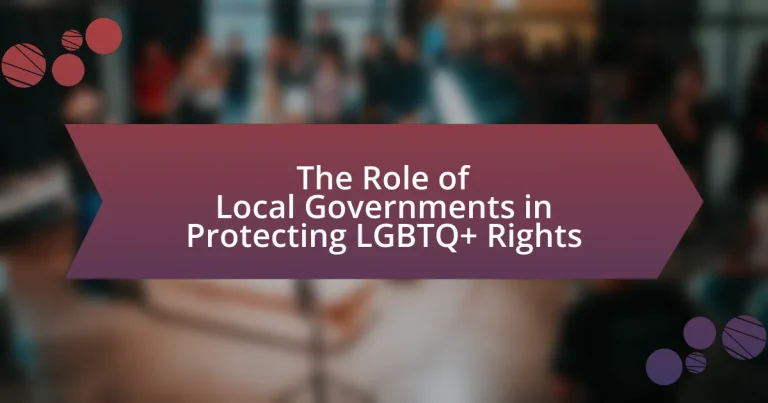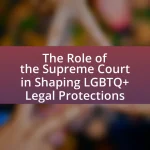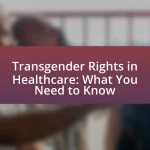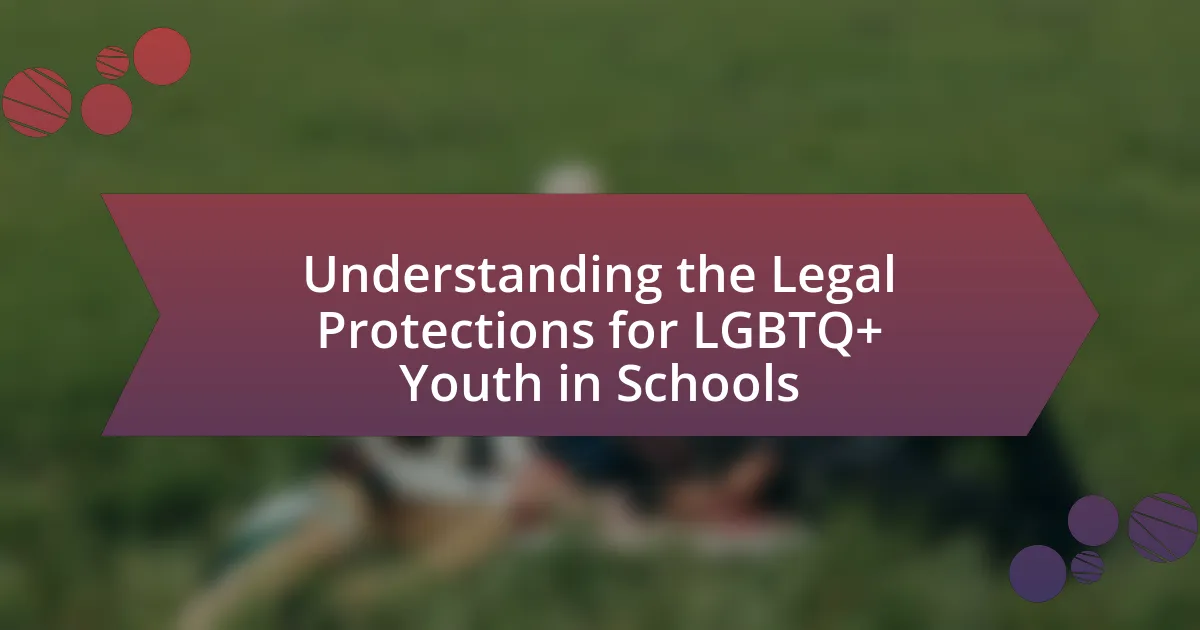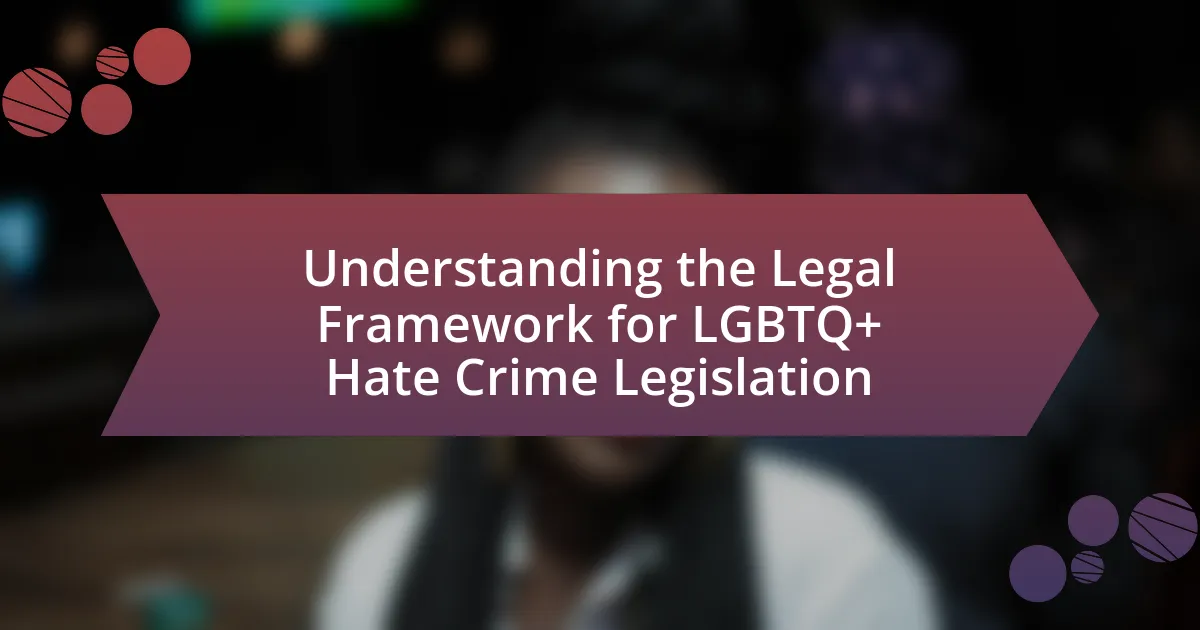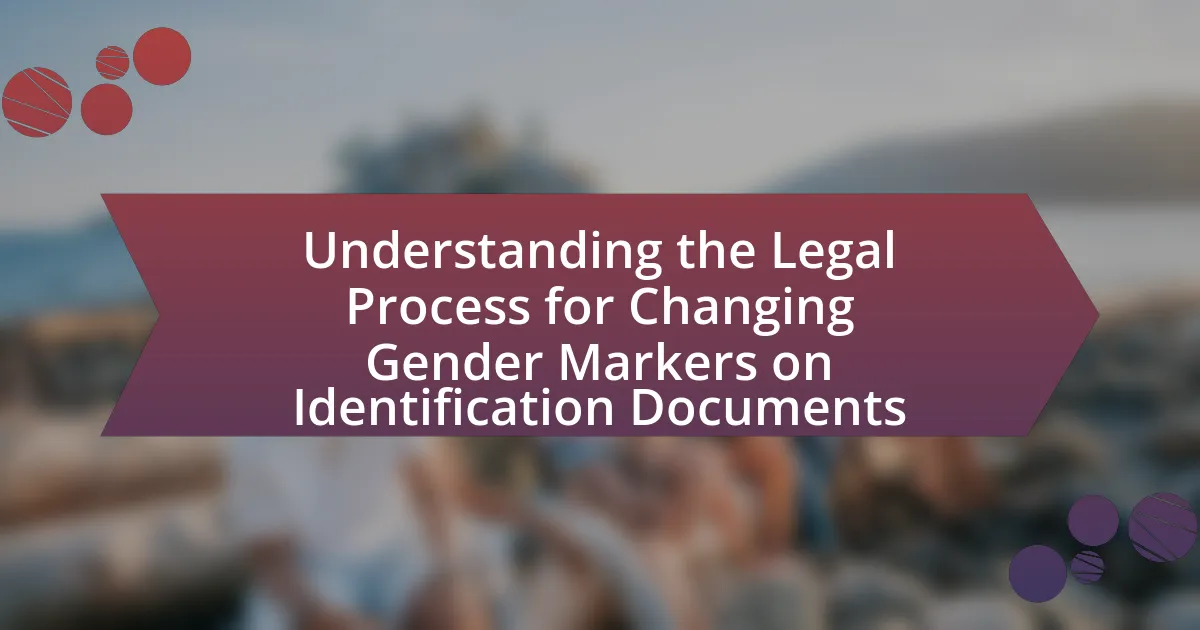Local governments play a vital role in protecting LGBTQ+ rights through the enactment of non-discrimination ordinances and policies that prohibit discrimination based on sexual orientation and gender identity. Over 500 municipalities in the United States have implemented such protections, which extend to employment, housing, and public accommodations. Local governments also collaborate with LGBTQ+ organizations to develop supportive programs, allocate resources, and engage in public education campaigns. However, challenges such as political climates, resource limitations, and varying state laws can hinder these efforts. Successful examples from cities like San Francisco and New York demonstrate effective strategies for enhancing LGBTQ+ rights, serving as models for other local governments.

What is the Role of Local Governments in Protecting LGBTQ+ Rights?
Local governments play a crucial role in protecting LGBTQ+ rights by enacting and enforcing local ordinances that prohibit discrimination based on sexual orientation and gender identity. These local policies often include protections in employment, housing, and public accommodations, which are essential for fostering an inclusive environment. For instance, as of 2021, over 400 municipalities in the United States have implemented non-discrimination ordinances that specifically protect LGBTQ+ individuals, demonstrating the proactive stance local governments can take. Additionally, local governments can provide resources and support for LGBTQ+ community organizations, facilitating access to services and advocacy. By engaging in public education campaigns and promoting awareness, local governments further contribute to the protection and advancement of LGBTQ+ rights within their jurisdictions.
How do local governments influence LGBTQ+ rights?
Local governments influence LGBTQ+ rights through the enactment of local ordinances, policies, and programs that promote equality and protect against discrimination. For instance, many municipalities have implemented non-discrimination laws that specifically include sexual orientation and gender identity, which provide legal protections in employment, housing, and public accommodations. According to a 2021 report by the Movement Advancement Project, over 400 local jurisdictions in the United States have adopted such protections, demonstrating the significant role local governments play in advancing LGBTQ+ rights. Additionally, local governments can allocate resources for LGBTQ+ community services, support public awareness campaigns, and foster inclusive environments through local leadership and advocacy, further solidifying their influence in this area.
What specific policies do local governments implement to support LGBTQ+ communities?
Local governments implement specific policies such as non-discrimination ordinances, inclusive healthcare access, and support for LGBTQ+ youth programs to support LGBTQ+ communities. Non-discrimination ordinances prohibit discrimination based on sexual orientation and gender identity in employment, housing, and public accommodations, with over 200 U.S. cities enacting such laws. Inclusive healthcare access policies ensure that LGBTQ+ individuals receive equitable healthcare services, often mandating that local health departments provide culturally competent care. Additionally, support for LGBTQ+ youth programs includes funding for safe spaces and educational initiatives aimed at reducing bullying and promoting acceptance in schools, which is critical given that LGBTQ+ youth are at a higher risk for mental health issues and homelessness.
How do local governments collaborate with LGBTQ+ organizations?
Local governments collaborate with LGBTQ+ organizations through policy development, funding initiatives, and community engagement. For instance, many local governments establish advisory boards that include LGBTQ+ representatives to ensure that policies reflect the needs of the community. Additionally, funding is often allocated to LGBTQ+ organizations for programs that promote health, safety, and equality, such as mental health services and anti-discrimination training. A notable example is the City of San Francisco, which has partnered with LGBTQ+ organizations to create the San Francisco LGBTQ+ Community Center, providing resources and support to the community. This collaboration not only enhances the visibility of LGBTQ+ issues but also fosters a more inclusive environment through joint events and outreach programs.
Why is local government involvement crucial for LGBTQ+ rights?
Local government involvement is crucial for LGBTQ+ rights because it directly influences the implementation of policies and protections at the community level. Local governments have the authority to enact ordinances that prohibit discrimination based on sexual orientation and gender identity, which can lead to immediate and tangible benefits for LGBTQ+ individuals. For instance, cities like San Francisco and New York have established comprehensive non-discrimination laws that protect LGBTQ+ residents in employment, housing, and public accommodations. These local measures often serve as models for state and federal legislation, demonstrating the impact of grassroots advocacy on broader legal frameworks. Furthermore, local governments can allocate resources for LGBTQ+ community services, such as health care and support programs, which are essential for addressing the unique challenges faced by this population.
What historical context shapes local government actions regarding LGBTQ+ rights?
Local government actions regarding LGBTQ+ rights are shaped by a historical context that includes the civil rights movement, the Stonewall Riots of 1969, and evolving public attitudes towards sexual orientation and gender identity. The civil rights movement laid the groundwork for advocating equality, while the Stonewall Riots marked a pivotal moment in LGBTQ+ activism, leading to increased visibility and demands for rights. Additionally, the decriminalization of homosexuality in various jurisdictions and the legalization of same-sex marriage have influenced local policies, prompting governments to adopt more inclusive measures. For instance, cities like San Francisco and New York have implemented anti-discrimination laws and protections for LGBTQ+ individuals, reflecting a broader societal shift towards acceptance and equality.
How do local governments address discrimination against LGBTQ+ individuals?
Local governments address discrimination against LGBTQ+ individuals by implementing inclusive policies and ordinances that protect their rights. Many municipalities have enacted non-discrimination laws that prohibit discrimination based on sexual orientation and gender identity in areas such as employment, housing, and public accommodations. For instance, as of 2023, over 500 cities in the United States have adopted such protections, reflecting a growing recognition of LGBTQ+ rights at the local level. Additionally, local governments often provide training for law enforcement and public service employees to ensure respectful treatment of LGBTQ+ individuals, further promoting equality and reducing instances of discrimination.

What challenges do local governments face in protecting LGBTQ+ rights?
Local governments face significant challenges in protecting LGBTQ+ rights, primarily due to varying levels of political support and public opinion. Many local officials may lack the political will to advocate for LGBTQ+ protections, influenced by constituents who hold conservative views. Additionally, local governments often operate under state laws that may not provide comprehensive protections for LGBTQ+ individuals, limiting their ability to enact inclusive policies. For instance, in states without explicit anti-discrimination laws, local ordinances may be challenged or overturned, undermining local efforts. Furthermore, resource constraints can hinder the implementation of programs aimed at supporting LGBTQ+ communities, as local governments may prioritize other pressing issues. These factors collectively create a complex environment where local governments struggle to effectively safeguard LGBTQ+ rights.
How do political climates affect local government actions on LGBTQ+ issues?
Political climates significantly influence local government actions on LGBTQ+ issues by shaping policy priorities and resource allocation. In progressive political environments, local governments are more likely to implement inclusive policies, such as anti-discrimination laws and support for LGBTQ+ community services, as seen in cities like San Francisco and New York, where local administrations actively promote LGBTQ+ rights. Conversely, in conservative political climates, local governments may enact restrictive measures, such as banning LGBTQ+ curricula in schools or opposing same-sex marriage, as evidenced by actions taken in various states with conservative leadership. This dynamic illustrates how the prevailing political ideology directly impacts the extent and nature of local government engagement with LGBTQ+ rights.
What role does public opinion play in shaping local government policies?
Public opinion significantly influences local government policies by reflecting the values and priorities of the community. When a majority of residents express support for LGBTQ+ rights, local governments are more likely to enact policies that protect these rights, such as anti-discrimination laws and inclusive practices. For instance, a 2020 Gallup poll indicated that 70% of Americans support same-sex marriage, which has led many local governments to adopt policies that align with this public sentiment. This alignment occurs because elected officials often seek to maintain their positions by responding to the views of their constituents, thereby making public opinion a critical factor in policy formulation and implementation.
How do resource limitations impact local government initiatives for LGBTQ+ rights?
Resource limitations significantly hinder local government initiatives for LGBTQ+ rights by restricting funding and personnel dedicated to advocacy and support programs. For instance, when local governments face budget cuts, they often prioritize essential services over initiatives aimed at promoting LGBTQ+ equality, resulting in fewer resources for outreach, education, and legal assistance. A study by the Movement Advancement Project indicates that municipalities with limited budgets are less likely to implement comprehensive non-discrimination policies or provide adequate training for law enforcement on LGBTQ+ issues, thereby perpetuating systemic inequalities.
What legal frameworks support local governments in protecting LGBTQ+ rights?
Local governments are supported in protecting LGBTQ+ rights through various legal frameworks, including federal laws, state statutes, and local ordinances. The federal framework includes the Civil Rights Act of 1964, which prohibits discrimination based on sex, and the Supreme Court’s ruling in Bostock v. Clayton County (2020), which interpreted this to include sexual orientation and gender identity. Additionally, many states have enacted their own laws that explicitly protect LGBTQ+ individuals from discrimination in areas such as employment, housing, and public accommodations. Local governments often build upon these protections by implementing ordinances that further safeguard LGBTQ+ rights, such as non-discrimination policies and inclusive practices in public services. These legal frameworks collectively empower local governments to create more inclusive environments for LGBTQ+ individuals.
What federal laws influence local government policies on LGBTQ+ rights?
Federal laws that influence local government policies on LGBTQ+ rights include the Civil Rights Act of 1964, the Fair Housing Act, and the Employment Non-Discrimination Act (ENDA). The Civil Rights Act prohibits discrimination based on sex, which has been interpreted by courts to include sexual orientation and gender identity, thereby impacting local employment policies. The Fair Housing Act prohibits discrimination in housing, affecting local housing policies for LGBTQ+ individuals. ENDA, although not yet passed as a standalone law, has influenced local governments to adopt non-discrimination policies in employment based on sexual orientation and gender identity. These laws collectively shape how local governments formulate and enforce policies that protect LGBTQ+ rights.
How do state laws interact with local government efforts to protect LGBTQ+ individuals?
State laws can either support or hinder local government efforts to protect LGBTQ+ individuals, depending on the specific legal framework in place. For instance, some states have enacted laws that explicitly allow local governments to implement anti-discrimination ordinances, thereby enhancing protections for LGBTQ+ individuals at the local level. Conversely, other states have passed preemption laws that restrict local governments from enacting such protections, effectively limiting their ability to address LGBTQ+ rights independently. A notable example is the 2016 North Carolina law that restricted local governments from enacting non-discrimination ordinances, which faced significant backlash and legal challenges. This interaction illustrates the complex relationship between state and local governance regarding LGBTQ+ rights, where state legislation can significantly influence the scope and effectiveness of local protections.

What successful examples exist of local governments protecting LGBTQ+ rights?
Local governments have successfully protected LGBTQ+ rights through various initiatives and policies. For instance, San Francisco implemented a comprehensive non-discrimination ordinance that prohibits discrimination based on sexual orientation and gender identity in employment, housing, and public accommodations. This ordinance has been instrumental in creating a more inclusive environment for LGBTQ+ individuals. Additionally, New York City established the Office of LGBTQ+ Affairs, which focuses on addressing issues affecting the LGBTQ+ community and promoting equality through city services and programs. These efforts are supported by data showing that cities with strong LGBTQ+ protections experience lower rates of hate crimes and discrimination, highlighting the effectiveness of local government actions in safeguarding these rights.
How have specific local governments implemented effective LGBTQ+ policies?
Local governments have implemented effective LGBTQ+ policies through measures such as inclusive non-discrimination ordinances, comprehensive anti-bullying laws in schools, and the establishment of LGBTQ+ advisory boards. For instance, cities like San Francisco have enacted non-discrimination laws that protect LGBTQ+ individuals in employment, housing, and public accommodations, which have been instrumental in reducing discrimination. Additionally, New York City has implemented a comprehensive anti-bullying policy that specifically addresses the needs of LGBTQ+ youth, contributing to a safer school environment. Furthermore, local governments like those in Seattle have created LGBTQ+ advisory boards to ensure that the voices of LGBTQ+ community members are included in policy-making processes, thereby fostering a more inclusive governance structure. These initiatives demonstrate a commitment to protecting LGBTQ+ rights at the local level.
What programs have shown measurable success in supporting LGBTQ+ communities?
Programs that have shown measurable success in supporting LGBTQ+ communities include the Human Rights Campaign’s Municipal Equality Index, which evaluates cities on their LGBTQ+ inclusivity policies. This program has led to increased awareness and implementation of supportive measures in local governments, resulting in improved access to services and protections for LGBTQ+ individuals. Additionally, the LGBTQ+ Youth Homelessness Prevention Initiative has effectively reduced homelessness rates among LGBTQ+ youth by providing targeted resources and support, demonstrating a significant impact on their well-being and stability. These programs are backed by data indicating improved outcomes in community engagement and resource allocation for LGBTQ+ populations.
How do these examples serve as models for other local governments?
These examples serve as models for other local governments by demonstrating effective strategies for implementing policies that protect LGBTQ+ rights. For instance, cities that have enacted inclusive non-discrimination ordinances provide a framework for others to follow, showcasing the legal mechanisms and community engagement necessary for successful implementation. Additionally, local governments that have established LGBTQ+ advisory boards illustrate the importance of direct representation and input from the community, which can enhance policy effectiveness and foster trust. These models are validated by the positive outcomes observed in cities with such initiatives, including increased community safety and improved mental health among LGBTQ+ residents.
What best practices can local governments adopt to enhance LGBTQ+ rights protection?
Local governments can enhance LGBTQ+ rights protection by implementing comprehensive non-discrimination policies that explicitly include sexual orientation and gender identity. These policies create a legal framework that protects LGBTQ+ individuals from discrimination in employment, housing, and public services. For instance, cities like San Francisco and New York have enacted such policies, resulting in increased protections and resources for LGBTQ+ communities. Additionally, local governments can establish LGBTQ+ advisory boards to ensure that the voices of LGBTQ+ individuals are included in decision-making processes, fostering a more inclusive environment. Research indicates that cities with active LGBTQ+ advisory boards report higher levels of community engagement and satisfaction among LGBTQ+ residents. Furthermore, local governments should provide training for law enforcement and public service employees on LGBTQ+ issues to reduce bias and improve interactions with LGBTQ+ individuals. Studies show that such training leads to better understanding and support for LGBTQ+ rights within public institutions.
How can local governments engage with LGBTQ+ communities effectively?
Local governments can engage with LGBTQ+ communities effectively by establishing inclusive policies and creating platforms for dialogue. Inclusive policies, such as non-discrimination ordinances and support for LGBTQ+ events, demonstrate commitment to equality and foster trust. Additionally, local governments can host town hall meetings and forums specifically for LGBTQ+ individuals to voice their concerns and needs, ensuring their perspectives are heard and considered in decision-making processes. Research indicates that cities with active LGBTQ+ advisory boards report higher levels of community satisfaction and engagement, highlighting the importance of direct involvement in governance.
What strategies can local governments use to promote inclusivity and equality?
Local governments can promote inclusivity and equality by implementing policies that support anti-discrimination laws, ensuring equitable access to services, and fostering community engagement. For instance, enacting local ordinances that prohibit discrimination based on sexual orientation and gender identity can create a legal framework that protects LGBTQ+ individuals. Additionally, local governments can provide training for public service employees on inclusivity and cultural competency, which has been shown to improve service delivery and community relations. Engaging with LGBTQ+ advocacy groups in decision-making processes ensures that the voices of marginalized communities are heard, leading to more effective and representative policies. Studies indicate that cities with inclusive policies experience lower rates of hate crimes and improved overall community well-being, demonstrating the effectiveness of these strategies.
